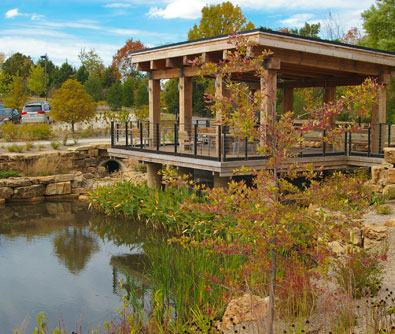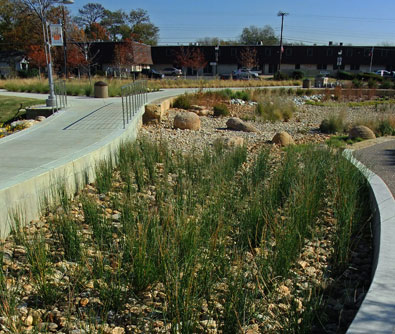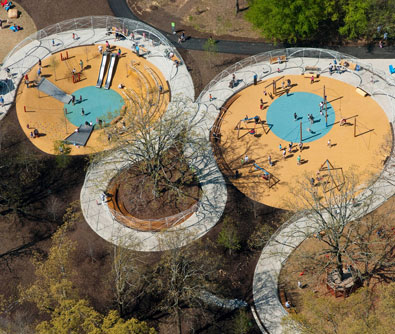SITES Certifies First Three Pilot Projects
 WASHINGTON — The Sustainable Sites Initiative has certified the first three projects under its new rating system that evaluates the sustainable design, construction and maintenance of built landscapes.
WASHINGTON — The Sustainable Sites Initiative has certified the first three projects under its new rating system that evaluates the sustainable design, construction and maintenance of built landscapes.
The projects honored were the Novus International campus in St. Charles, Mo., the Green at College Park of the University of Texas at Arlington, and the Woodland Discovery Playground at Shelby Farms Park in Memphis, Tenn. They were selected out of more than 150 pilot projects that have been seeking certification since summer 2010.
The Sustainable Sites Initiative was formed in 2005 to recognize and establish guidelines for green landscapes. It marks a partnership between the American Society of Landscape Architects (ASLA), the Lady Bird Johnson Wildflower Center of the University of Texas at Austin, and the United States Botanic Garden.
The voluntary national rating system, which evaluates sustainable landscapes in areas with or without buildings, was developed with the input of experts, scientists and design professionals focused on sustainability.
In June 2010, several pilot projects at various stages of development were submitted to the judging panel, which awards up to four stars and takes into account factors such as soil restoration, use of recycled materials and land-maintenance approaches. The rating system consists of 15 prerequisites and 51 additional categories.
The Novus headquarters received three stars, while the Green at College Park and the Woodland Discovery Playground received one star each.
“The educational value of these pilot projects is significant,” said Holly Shimizu, executive director of the U.S. Botanic Garden, one of the judging bodies. “They demonstrate what a sustainable site looks and feels like and now serve as a model to others aspiring for sustainability in a designed landscape. Having the first pilot projects certified solidifies years of work into something tangible that we hope will be replicated all around the country.”
For its 9-acre headquarters, Novus, which produces health and nutrition products for people and animals, worked with St. Louis-based SWT Design to develop a parking lot with stormwater retention features, a walking trail that winds through a restored prairie and other habitats, and a vegetable garden maintained by staff members.
 To renovate the Green at College Park, an outdoor space that is part of the University of Texas at Arlington’s downtown transformation, David Hopman, a landscape architecture professor, and other project leaders worked with Arlington, Texas-based landscape design, architecture and civil engineering company Schrickel, Rollins and Associates, Inc.
To renovate the Green at College Park, an outdoor space that is part of the University of Texas at Arlington’s downtown transformation, David Hopman, a landscape architecture professor, and other project leaders worked with Arlington, Texas-based landscape design, architecture and civil engineering company Schrickel, Rollins and Associates, Inc.
The site had mostly served as a parking lot with poor stormwater drainage that flooded a nearby creek. Now, it features native and adapted plants in rain gardens and a water detention system that helps collect and clean stormwater to rewater the green space. It also features an open lawn, a pedestrian promenade and a shade arbor.
“Developing inviting outdoor spaces that make the most of precious resources, such as water, is critical to our future,” said Susan Rieff, executive director of the Lady Bird Johnson Wildflower Center. “These projects powerfully demonstrate how sustainably designed landscapes can produce environmental, economic and aesthetic benefits.”
The 4.25-acre space at the Woodland Discovery playground restored the woodland with the aim of promoting children’s health. The conservancy that oversees Shelby Farms Park, along with New York-based design firm James Corner Field Operations, developed it.
 Sustainability features include recycled shoe material that cover several play areas, as well as recycled boot material that sits under a playroom of nets and tree houses. The permeable materials allow stormwater to leak through and nourish trees that connect the playrooms. The design was based on input from workshops with children and adults.
Sustainability features include recycled shoe material that cover several play areas, as well as recycled boot material that sits under a playroom of nets and tree houses. The permeable materials allow stormwater to leak through and nourish trees that connect the playrooms. The design was based on input from workshops with children and adults.
“The innovation and analytical thinking of these first certified projects is helping point the way for the next iteration of the guidelines, which will form the basis for open certification in 2013,” said Nancy Somerville, ASLA’s executive vice president and CEO.
The Sustainable Sites Initiative will continue to collect feedback from the pilot projects until June 2012. The finalized rating system and reference guide are expected to be released in 2013.
